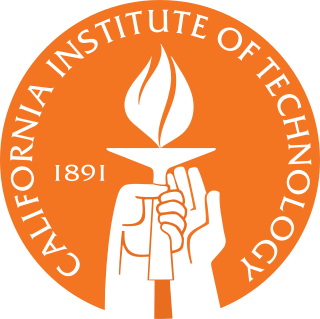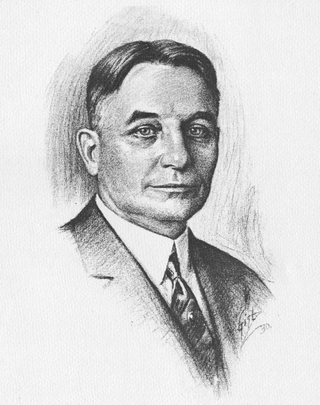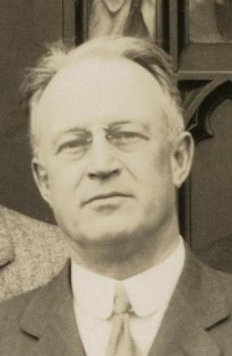
The California Institute of Technology (branded as Caltech) is a private research university in Pasadena, California, United States. The university is responsible for many modern scientific advancements and is among a small group of institutes of technology in the United States that are devoted to the instruction of pure and applied sciences.

Robert Andrews Millikan was an American experimental physicist who won the Nobel Prize for Physics in 1923 for the measurement of the elementary electric charge and for his work on the photoelectric effect.

Shirley Ann Mount Hufstedler was an American attorney and judge who served as the first United States Secretary of Education from 1979 to 1981. She previously served as a U.S. circuit judge of the U.S. Ninth Circuit Court of Appeals from 1968 to 1979.

Paul Bowman Popenoe was an American marriage counselor, eugenicist and agricultural explorer. He was an influential advocate of the compulsory sterilization of mentally ill people and people with mental disabilities, and the father of marriage counseling in the United States.

Harry Hamilton Laughlin was an American educator and eugenicist. He served as the superintendent of the Eugenics Record Office from its inception in 1910 to its closure in 1939, and was among the most active individuals influencing American eugenics policy, especially compulsory sterilization legislation.

Charles Matthias Goethe was an American eugenicist, entrepreneur, land developer, philanthropist, conservationist, founder of the Eugenics Society of Northern California, and a native and lifelong resident of Sacramento, California.

Lewis Madison Terman was an American psychologist, academic, and proponent of eugenics. He was noted as a pioneer in educational psychology in the early 20th century at the Stanford School of Education. Terman is best known for his revision of the Stanford–Binet Intelligence Scales and for initiating the longitudinal study of children with high IQs called the Genetic Studies of Genius. As a prominent eugenicist, he was a member of the Human Betterment Foundation, the American Eugenics Society, and the Eugenics Research Association. He also served as president of the American Psychological Association. A Review of General Psychology survey, published in 2002, ranked Terman as the 72nd most cited psychologist of the 20th century, in a tie with G. Stanley Hall.
The American Eugenics Society (AES) was a pro-eugenics organization dedicated to "furthering the discussion, advancement, and dissemination of knowledge about biological and sociocultural forces which affect the structure and composition of human populations". It endorsed the study and practice of eugenics in the United States. Its original name as the American Eugenics Society lasted from 1922 to 1973, but the group changed their name after open use of the term "eugenics" became disfavored; it was known as the Society for the Study of Social Biology from 1973–2008, and the Society for Biodemography and Social Biology from 2008–2019. The Society was disbanded in 2019.
The Adelphi Genetics Forum is a non-profit learned society based in the United Kingdom. Its aims are "to promote the public understanding of human heredity and to facilitate informed debate about the ethical issues raised by advances in reproductive technology."

Ezra Seymour Gosney was an American businessman and philanthropist who supported the practice of eugenics. In 1928 he founded the Human Betterment Foundation (HBF) in Pasadena, California, with the stated aim "to foster and aid constructive and educational forces for the protection and betterment of the human family in body, mind, character, and citizenship," primarily through the advocacy of compulsory sterilization of people who are mentally ill or intellectually disabled. Rufus B. von KleinSmid, President of University of Southern California, was a co-founder.

William Bennett Munro was a Canadian historian and political scientist. He taught at Harvard University and the California Institute of Technology. He was known for research on the seigneurial system in New France and on municipal administration in the United States.

Henry Gordon Gale was an American astrophysicist and author.
Samuel Jackson Holmes was an American zoologist and eugenicist. He was a professor at the University of California, Berkeley from 1912 to 1938. He was a genetics researcher who studied animal behavior, heredity, and evolution. Over the course of his career he migrated from studying animals to humans, taking the behaviors and traits learned in the former and looking for them in the latter.
Law for the Prevention of Genetically Diseased Offspring or "Sterilisation Law" was a statute in Nazi Germany enacted on July 14, 1933, which allowed the compulsory sterilisation of any citizen who in the opinion of a "Genetic Health Court" suffered from a list of alleged genetic disorders – many of which were not, in fact, genetic. The elaborate interpretive commentary on the law was written by three dominant figures in the racial hygiene movement: Ernst Rüdin, Arthur Gütt and the lawyer Falk Ruttke.

Rufus Bernhard von KleinSmid, also spelled Kleinsmidt, was an American academic administrator: he was the seventh president of the University of Arizona (1914–1921) and the fifth president of the University of Southern California (1921–1947). At both universities he was notable in accomplishing capital and academic programs.

Harry Chandler was an American newspaper publisher and investor.

Eugenics, the set of beliefs and practices which aims at improving the genetic quality of the human population, played a significant role in the history and culture of the United States from the late 19th century into the mid-20th century. The cause became increasingly promoted by intellectuals of the Progressive Era.

Eugenics in California is a notable part of eugenics in the United States. As an early leading force in the field of eugenics, California became the third state in the United States to enact a sterilization law. By 1921, California had accounted for 80% of sterilizations nationwide. This continued until the Civil Rights Movement, when widespread critiques against society's "total institutions" dismantled popular acceptance for the state's forced sterilizations. There were an estimated 20,000 forced sterilizations in California between 1909 and 1979; however, that number may be an underestimation. In 2021, California enacted a reparations program to compensate the hundreds of still living victims from its eugenics program.
Sterilization of Latinas has been practiced in the United States on women of different Latin American identities, including those from Puerto Rico and Mexico. There is a significant history of such sterilization practices being conducted involuntarily, in a coerced or forced manner, as well as in more subtle forms such as that of constrained choice. Forced sterilization was permissible by multiple states throughout various periods in the 20th century. Issues of state sterilization have persisted as recently as September 2020. Some sources credit the practice to theories of racial eugenics.
Marian Stephenson Olden (1881–1981) was an American eugenics activist and an influential figure in the sterilization movement. She founded the Sterilization League of New Jersey in 1937, which unsuccessfully lobbied for New Jersey to pass a law enabling the compulsory sterilization of those considered unfit to procreate. In the years following World War II, the sterilization movement distanced itself from Olden, whose increasingly unpopular views on compulsory sterilization, and abrasive, uncompromising personality were seen as liabilities. The Sterilization League, then known as Birthright Inc., formally severed ties with Olden in 1948.














